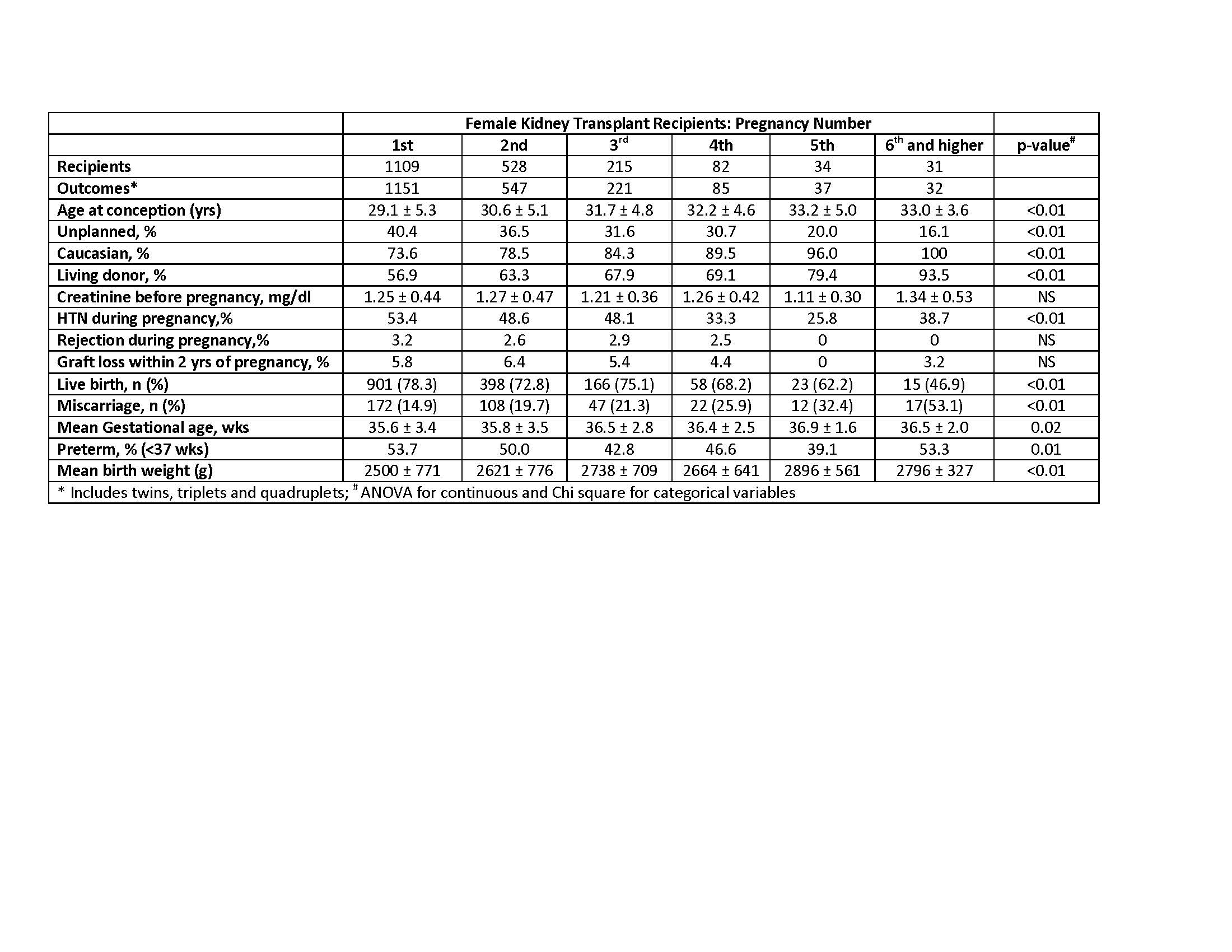Outcomes of Successive Pregnancies in Kidney Transplant Recipients
S. Rao1, L. Coscia2, S. Constantinescu3, M. J. Moritz4
1Medicine, University of Virginia Heath System, Charlottesville, VA, 2Transplant Pregnancy Registry International, Philadelphia, PA, 3Medicine, Lewis Katz School of Medicine at Temple University, Philadelphia, PA, 4Surgery, Lehigh Valley Health Network, Allentown, PA
Meeting: 2020 American Transplant Congress
Abstract number: 552
Keywords: Kidney transplantation, Pregnancy, Quality of life
Session Information
Session Time: 3:15pm-4:45pm
 Presentation Time: 4:15pm-4:27pm
Presentation Time: 4:15pm-4:27pm
Location: Virtual
*Purpose: Pregnancy after transplant is considered high risk; nevertheless female kidney transplant (KT) recipients may have several post-transplant pregnancies. The aim of this study was to analyze maternal, allograft, and neonatal outcomes for successive pregnancies in KT recipients.
*Methods: Data were collected by the Transplant Pregnancy Registry International (TPR) via questionnaires, phone interviews and medical record reviews.
*Results: 45% of KT recipients in the TPR report consecutive pregnancies. Of 1109 KT recipients with post-transplant pregnancies, 528 had between 2 and 13 subsequent pregnancies. With successive pregnancies, there was a decrease in the incidence of unplanned pregnancies. Preconception serum creatinine was similar and the rates of rejection during pregnancy and graft loss within 2yrs remained low in successive pregnancies. The majority of pregnancies (75%) resulted in live birth but half of the newborns were premature (<37 weeks), with a trend of increased gestational age and birth weight with successive pregnancies (p<0.01). The decrease in live birth and higher miscarriage rate with successive pregnancies despite similar allograft function and lower rates of HTN during pregnancy (p<0.01) suggest non-transplant related obstetric factors. Overall, birth defect incidence remains low (6.5%) and similar across the cohort. Rate of Cesarean section is high (52%).
*Conclusions: KT recipients commonly have successive pregnancies which and are not associated with adverse maternal, allograft or newborn outcomes. There seems to be a natural selection towards stable pre-pregnancy allograft function and non-transplant associated obstetric complications in women pursuing consecutive pregnancies. Women with good kidney graft function who desire more than one pregnancy should not be discouraged to conceive, but appropriately counseled.
To cite this abstract in AMA style:
Rao S, Coscia L, Constantinescu S, Moritz MJ. Outcomes of Successive Pregnancies in Kidney Transplant Recipients [abstract]. Am J Transplant. 2020; 20 (suppl 3). https://atcmeetingabstracts.com/abstract/outcomes-of-successive-pregnancies-in-kidney-transplant-recipients/. Accessed February 14, 2026.« Back to 2020 American Transplant Congress

